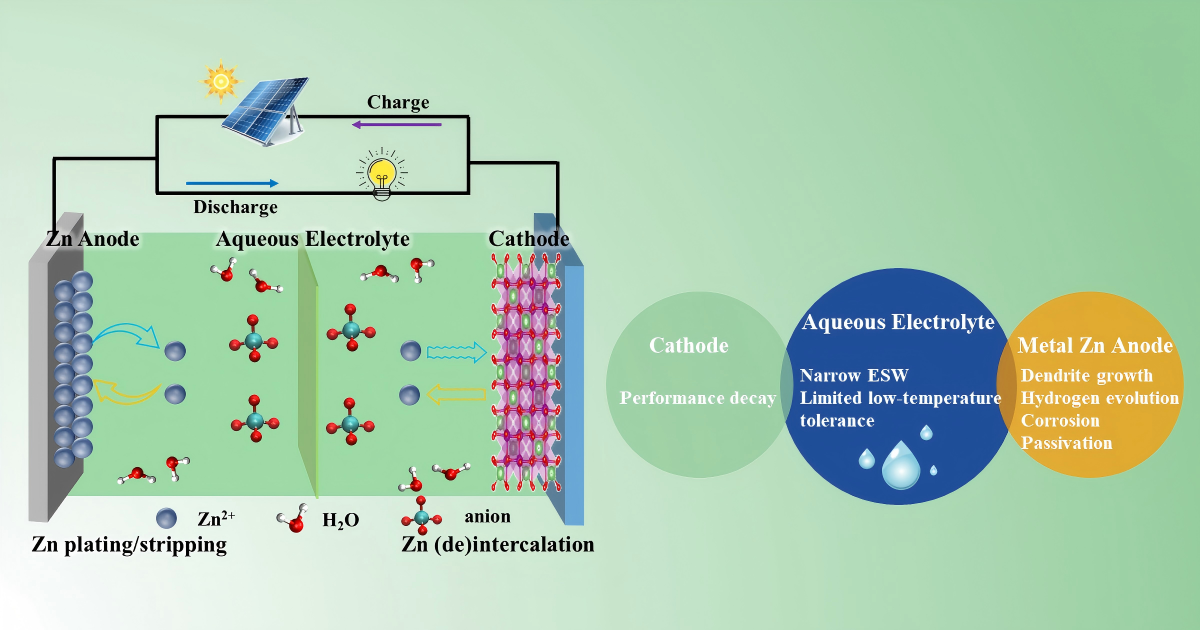Rechargeable Aqueous Zn-Ion Batteries
A special issue of Batteries (ISSN 2313-0105).
Deadline for manuscript submissions: 15 July 2026 | Viewed by 2739

Special Issue Editors
Interests: flexible energy storage devices; aqueous metal-ion batteries; flexible wearable devices
Special Issue Information
Dear Colleagues,
Aqueous zinc-ion batteries (AZIBs) are highly desirable as promising energy storage devices due to their high theoretical capacity, inherent safety, and environmental friendliness. However, their widespread deployment is critically impeded by inherent thermodynamic and electrochemical instabilities, which seriously affect their operational lifespan and safety. These encompass limitations in the aqueous electrolyte (intrinsically narrow electrochemical stability window (ESW) and limited low-temperature tolerance), pervasive Zn anode degradation (dendrite growth, hydrogen evolution, corrosion, passivation), and cathode material decay. These interconnected challenges significantly reduce their operational lifespan, energy density, and reliability. Overcoming these bottlenecks is crucial for advancing the application of aqueous zinc-ion batteries in fields such as grid-level energy storage, wearable electronics, and biomedical applications. This Special Issue aims to collate and showcase cutting-edge research, insightful reviews, and forward-looking perspectives that offer fundamental insights and propose innovative strategies for the holistic advancement of high-performance AZIBs.
Potential topics include, but are not limited to, the following:
- Advanced electrolytes (broadened ESW and enhanced temperature resilience);
- Low-temperature AZIBs;
- High-performance cathodes (novel materials and mechanisms);
- Highly reversible zinc metal anodes;
- Innovative cell configurations (cathode-free, hybrid systems, novel designs);
- Advanced flexible AZIBs design;
- AI/machine-learning-driven design and optimizationof AZIBs;
- AZIBs in smart systems (integrationin sensing, wearable electronics);
- Novel applications and system-level integration of high-performance AZIBs.
Dr. Guoshen Yang
Dr. Yachao Zhu
Guest Editors
Manuscript Submission Information
Manuscripts should be submitted online at www.mdpi.com by registering and logging in to this website. Once you are registered, click here to go to the submission form. Manuscripts can be submitted until the deadline. All submissions that pass pre-check are peer-reviewed. Accepted papers will be published continuously in the journal (as soon as accepted) and will be listed together on the special issue website. Research articles, review articles as well as short communications are invited. For planned papers, a title and short abstract (about 250 words) can be sent to the Editorial Office for assessment.
Submitted manuscripts should not have been published previously, nor be under consideration for publication elsewhere (except conference proceedings papers). All manuscripts are thoroughly refereed through a single-blind peer-review process. A guide for authors and other relevant information for submission of manuscripts is available on the Instructions for Authors page. Batteries is an international peer-reviewed open access monthly journal published by MDPI.
Please visit the Instructions for Authors page before submitting a manuscript. The Article Processing Charge (APC) for publication in this open access journal is 2700 CHF (Swiss Francs). Submitted papers should be well formatted and use good English. Authors may use MDPI's English editing service prior to publication or during author revisions.
Keywords
- aqueous zinc-ion batteries
- electrolyte engineering
- hydrogel electrolytes
- low-temperature properties
- high-performance cathodes
- zinc metal anodes
- dendrite suppression
- high energy density
- machine learning
Benefits of Publishing in a Special Issue
- Ease of navigation: Grouping papers by topic helps scholars navigate broad scope journals more efficiently.
- Greater discoverability: Special Issues support the reach and impact of scientific research. Articles in Special Issues are more discoverable and cited more frequently.
- Expansion of research network: Special Issues facilitate connections among authors, fostering scientific collaborations.
- External promotion: Articles in Special Issues are often promoted through the journal's social media, increasing their visibility.
- Reprint: MDPI Books provides the opportunity to republish successful Special Issues in book format, both online and in print.
Further information on MDPI's Special Issue policies can be found here.






